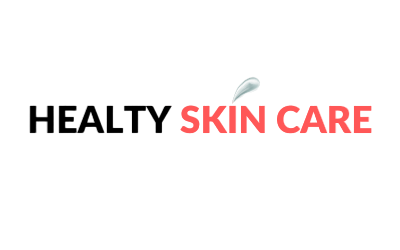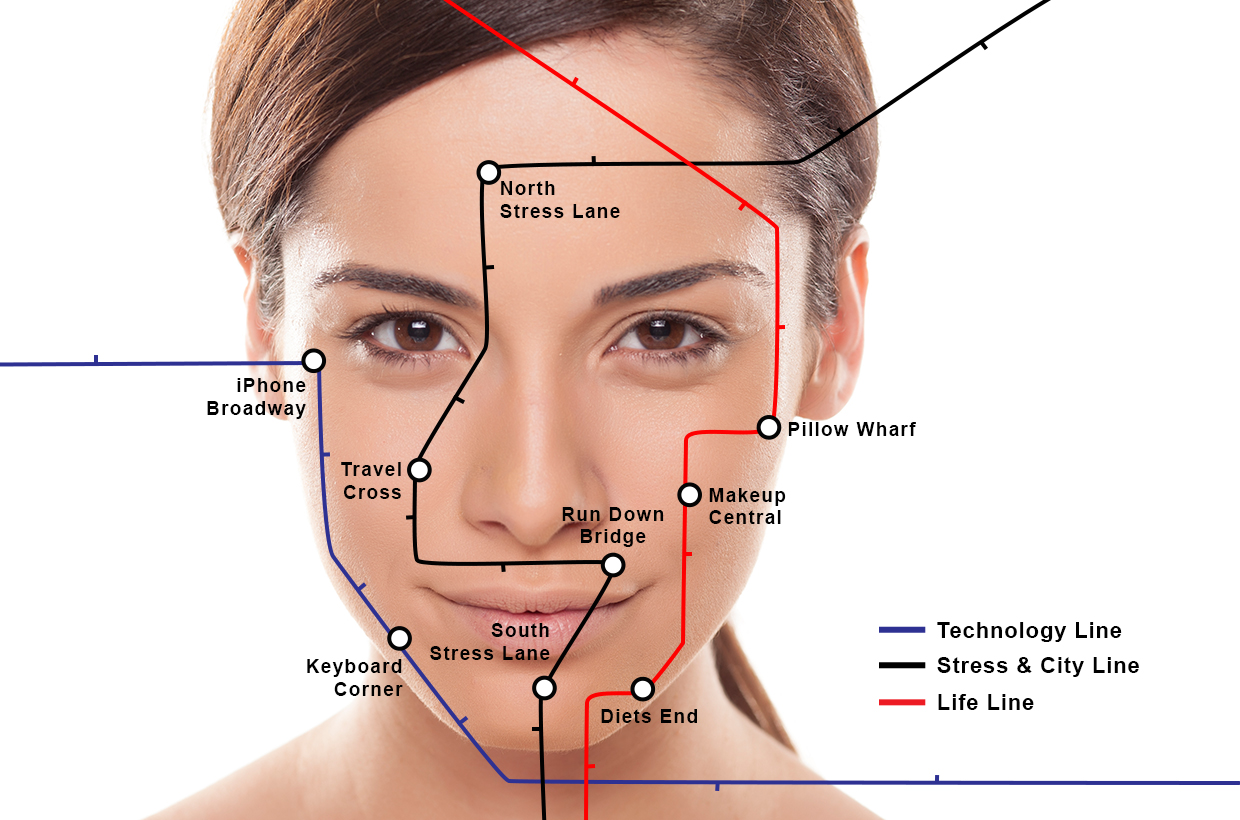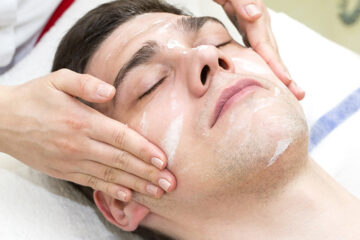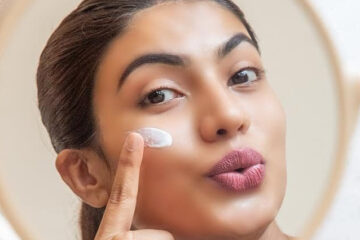Acne isn’t just a teenage phase; it’s a skin issue that plagues many of us well into adulthood. From unexpected breakouts before important events to persistent pimples that refuse to clear up, acne can be frustrating and bewildering. But what if I told you that your face could tell you what’s causing those pesky pimples?
Welcome to the world of face mapping—a technique that links facial blemishes to specific internal organs and underlying health issues. This ancient practice can offer modern skincare enthusiasts and beauty bloggers valuable insights into their skin’s health and how to maintain it. Let’s explore how face mapping can revolutionize your skincare routine and help you understand what your acne really means.
What is Face Mapping and Why It Matters
Face mapping is a diagnostic tool that traces its origins to ancient Chinese and Ayurvedic medicine. The method involves dividing the face into different zones, each corresponding to a specific internal organ or body function. For instance, breakouts on your forehead might indicate digestive issues, while pimples on your cheeks could be linked to respiratory problems.
How Face Mapping Works
The basic principle of face mapping is that our skin reflects our internal health. Each area of your face is connected to a different body part:
- Forehead: Linked to the digestive system and bladder
- Cheeks: Associated with the respiratory system
- Chin and Jawline: Often related to hormonal imbalances
By identifying the affected area, you can better understand the root cause of your acne and take appropriate measures to address it.
Signs of a Damaged Skin Barrier
A damaged skin barrier can exacerbate acne and other skin issues. Symptoms include redness, itchiness, and increased sensitivity. If your skin feels rough and looks dull, it’s a sign that your skin barrier needs some TLC. Face mapping can help pinpoint which areas are worst affected, making it easier to tailor your skincare routine.
The Science Behind Skin Barrier Function
Your skin barrier is the outermost layer of your skin, primarily composed of lipids that protect against external aggressors such as bacteria and pollutants. It also helps retain moisture, keeping your skin hydrated and healthy.
Factors That Compromise the Skin Barrier
Several factors can weaken your skin barrier, leading to acne and other skin issues:
- Environmental stressors: Pollution, UV radiation, and harsh weather conditions can strip away protective lipids.
- Incorrect skincare products: Over-exfoliating and using products with harsh chemicals can compromise the barrier.
- Diet and lifestyle: Poor nutrition and lack of sleep can negatively impact your skin’s health.
Nurturing Your Skin Barrier for Clearer Skin
To restore and strengthen your skin barrier, adopting a holistic approach is crucial. Start by choosing gentle, hydrating skincare products that are free from harsh chemicals and alcohol, which can irritate the skin. Look for ingredients like ceramides, hyaluronic acid, and essential fatty acids, which help repair and reinforce the skin’s natural defenses.
In addition to the right products, lifestyle changes can also make a significant impact. Prioritizing a balanced diet rich in antioxidants, healthy fats, and vitamins will support not only your skin health but your overall well-being. Drinking sufficient water throughout the day is equally important for maintaining hydration levels. Moreover, managing stress through practices such as yoga or meditation can alleviate acne triggered by hormonal fluctuations.
Lastly, consider incorporating a consistent skincare routine that focuses on moisturizing and protecting your skin barrier. This can include applying a soothing serum or moisturizer after cleansing and using sunscreen daily to shield against UV damage. By nurturing your skin barrier and addressing the underlying causes of your acne, you’ll be well on your way to achieving clearer, healthier skin.
Latest Research
Recent studies from the American Academy of Dermatology emphasize that a healthy skin barrier is crucial for overall skin health. Maintaining it can prevent various skin conditions, including acne.
Step-by-Step Guide to Repairing the Skin Barrier
Identify Your Skin Type and Barrier Condition
The first step is to understand your skin type—whether it’s oily, dry, combination, or sensitive. This knowledge will guide you in choosing the right products for barrier repair.
Choosing the Right Skincare Products
Opt for products with ingredients known for their barrier-repairing properties:
- Ceramides: Help restore the skin’s natural lipids.
- Hyaluronic Acid: Retains moisture and plumps up the skin.
- Niacinamide: Reduces inflammation and strengthens the barrier.
Creating a Personalized Skincare Routine
Here’s how you can structure your skincare routine:
- Cleanser: Use a gentle, sulfate-free cleanser to avoid stripping natural oils.
- Toner: Choose a hydrating toner with soothing ingredients.
- Serum: Apply a serum with ceramides or hyaluronic acid.
- Moisturizer: Opt for a barrier-repairing moisturizer.
- Sunscreen: Always end your morning routine with a broad-spectrum SPF.
Consistency is key. Stick to your routine, and you’ll start noticing improvements within a few weeks.
Importance of Consistency and Patience
Repairing a damaged skin barrier takes time. Be patient and consistent with your skincare routine. Remember, it’s not about instant results but long-term skin health.
Best Practices and Dermatologist Recommendations
Key Tips for Maintaining a Healthy Skin Barrier
- Hydration: Drink plenty of water and use hydrating products.
- Avoid Over-exfoliating: Limit exfoliation to once or twice a week.
- Balanced Diet: Incorporate foods rich in omega-3 fatty acids and antioxidants.
Dermatologist Advice
Dr. Emily Wu, a renowned dermatologist, states, “Understanding the signs of a damaged skin barrier through face mapping can revolutionize your skincare routine, leading to healthier, clearer skin.”
Michelle Rodriguez, a skincare expert, adds, “Consistency and using the right products are key in restoring your skin barrier. Look for ingredients like ceramides, hyaluronic acid, and niacinamide for effective barrier repair.”
Professional Consultation
For severe skin barrier damage, consulting a dermatologist is crucial. They can provide tailored advice and recommend treatments that suit your specific skin needs.
Conclusion
Face mapping offers a unique way to understand the root causes of your acne and other skin issues. By integrating this ancient technique with modern skincare practices, you can achieve healthier, clearer skin.
Remember, repairing your skin barrier is a gradual process that requires consistency and the right products. Apply the knowledge you’ve gained from this guide to your skincare routine and see the results for yourself.
Engage with our community by sharing your experiences and tips in the comments below. And don’t forget to consult with a dermatologist for regular skin health checks. Your skin will thank you!
References
- American Academy of Dermatology
- Dermatology Times
- Journal of Investigative Dermatology
- Skin Health Alliance
Additional Resources for Skin Barrier Repair
Recommended Reading
To further enhance your understanding of skin health and barrier repair, consider exploring the following resources:
- Books:
- “The Skincare Bible” by Dr. Anjali Mahto – A comprehensive guide to understanding skin health and effective treatments.
- “Skin Cleanse” by Dr. J. Dermatology – Offers insights into simplifying your skincare routine while maintaining skin integrity.
- Websites:
- American Academy of Dermatology – A wealth of information on skin conditions and treatments.
- Skin Cancer Foundation – Focuses on the importance of sun protection and skin health.
Community Support
Engaging with others can be beneficial in your skincare journey. Join online forums or local groups where individuals share their experiences and advice on skincare routines. Platforms such as Reddit or specialized Facebook groups can offer valuable insights and support as you work towards healthier skin.
Tracking Your Progress
Consider keeping a skincare journal to document the products you use, your skin’s reaction, and any changes you notice over time. This can help you identify what works best for your skin type and reinforce your commitment to a consistent routine.
By equipping yourself with knowledge, seeking community support, and tracking your progress, you set the foundation for achieving and maintaining a healthy skin barrier.





